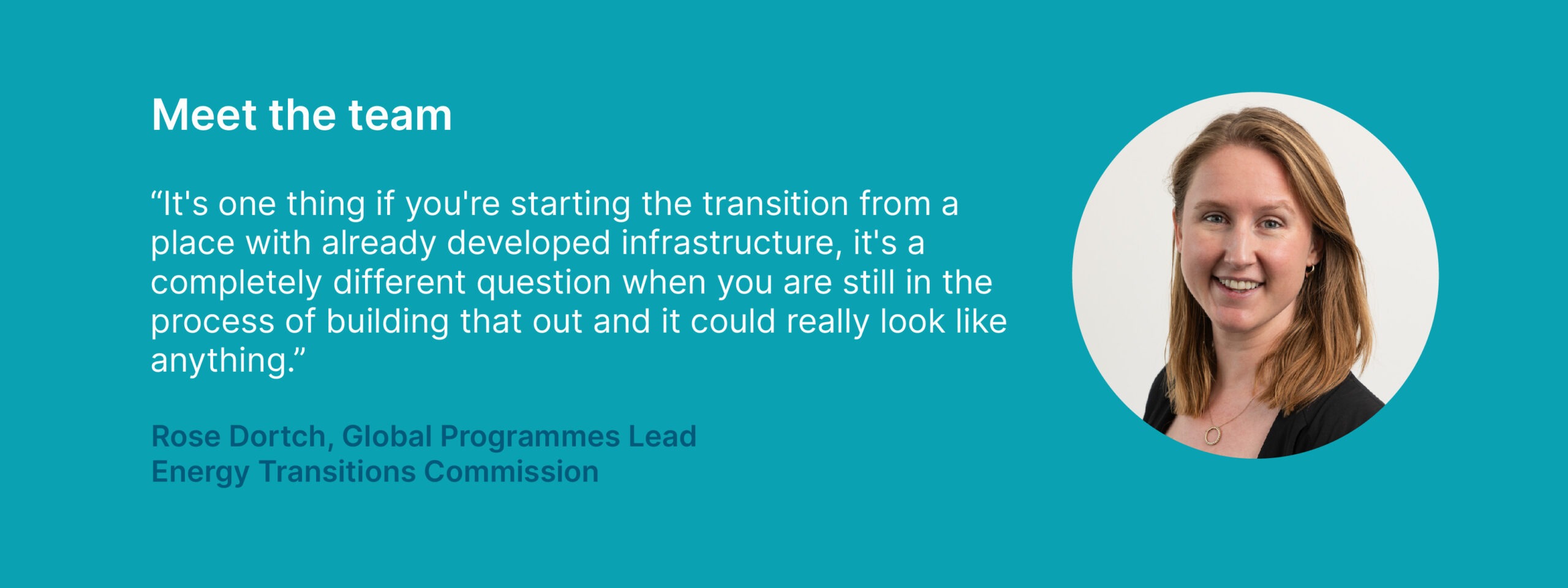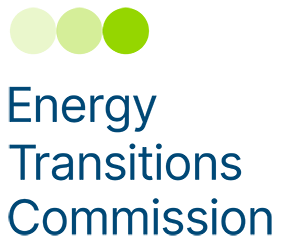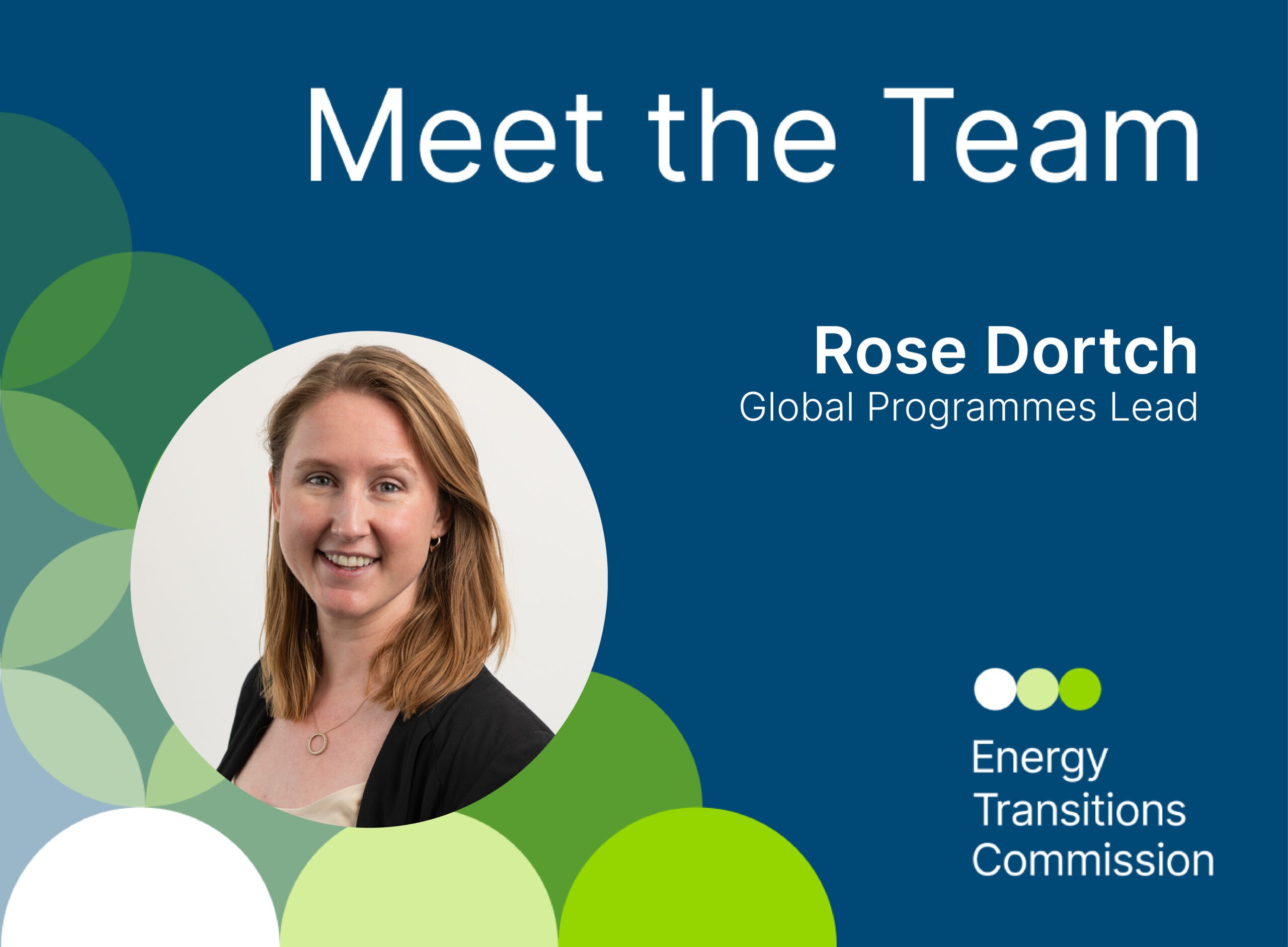Get to know Rose Dortch, Global Programmes Lead at the ETC. Rose oversees ETC’s relationships with 10 regional programmes around the world. She works with local teams who are on the ground and understand the local context to develop nationally grounded transition plans, supported by the ETC’s global analytical work. Rose helps to translate solutions from one regional context to other similar contexts and amplify local voices.

What made you join the ETC?
I’ve always been in the energy space and I’ve always been in sustainability. I was really drawn to the ETC though because of the coalition model. I liked the idea that people from different areas of industry – and quite frankly with very different viewpoints – could come together and not just align on something, but pick up and push the same message.
I think it brings a lot of impact that you wouldn’t have from individual actors alone. All of our publications have been well thought through and pressure tested by people from across the aisle. So it’s not just a think tank or a single individual that’s putting stuff out there. I think the ETC delivers really credible analysis and the coalition model gives it a lot of credibility as well.
What is your proudest achievement or achievements to date at the ETC?
When I first arrived at the ETC, I worked on A Path Across the Rift, a piece of work on sub-Saharan Africa that we did in conjunction with WRI Africa, led by Min Guan. I really loved the topic and I’ve always been interested in emerging markets and what can be done differently there: it’s one thing if you’re starting the transition from a place with already developed infrastructure, it’s a completely different question when you are still in the process of building that out and it could really look like anything.
I was also proud of the impact it had as we published ahead of COP27, where people were really focused on hearing from Africa. I loved the point of view that WRI Africa brought which was “we need to stop thinking of sub-Saharan Africa as a single location. There are over 45 countries there. We need to think about individual country solutions recognising that we do have the ability to build better than other people have done so far.”
I really loved having the local voice. When we went to COP that year, the ETC did a great job of amplifying voices that might not have otherwise had a platform.
What does the energy transition mean to you?
In a very straightforward sense it really is just moving away from carbon fuels towards a clean future. But for me also it’s also about how can we have a better quality of environment.
My parents are outdoorsy. We went camping every summer for a few months at a time. They go backpacking every year in the Rockies. They have a wood burning stove and cut all of their own firewood.
Being raised in that way made me very aware of our impact on the environment. So, when I think about the energy transition, I think about how can we make an impact for good, rather than impact that might actually be changing the world around us to a point that we can’t get back to enjoying it.
On the pathway to net zero, what do you see as the biggest obstacle?
First of all, I think that we have all of the technology that we need, it’s just a matter of going fast enough. And so that either means convincing people that aren’t convinced or mobilising stakeholders.
I worry sometimes that there’s this sense of: if you’ve got Earth’s natural environment and everybody thinks of it as everyone’s problem, but then you don’t have people actually stepping up to invest or take action or make change, then it keeps not getting solved. I don’t think people move fast enough because there’s sense of it’ll get done by somebody else.
I think my biggest concern with the transition is that we’ll keep thinking of it as like the world’s problem when we need to think of it as our problem.
What are you most excited about that’s coming up from the ETC?
We have been working with the Systemiq office in Brazil to set up an Energy Transition Initiative, looking at the Brazil transition to net-zero and I really hope we see it come to fruition.
I think it’s a perfect time for it. Brazil is at the forefront of everyone’s mind. Being the host of COP30 next year, I think there’s been a lot of focus put on them for all the good things they’re doing in terms of nature finance and looking at stopping deforestation. But I think that we could help them be even more impactful by thinking about things that they hadn’t traditionally thought of or reframing things where they really excel. So for example, Brazil excels at making biofuels. They’re the second largest producer of biofuels in the world. They’re already producing second generation biofuels, which are really complex and can be used for things like sustainable aviation fuel.
But, if we were able to get them to think about prioritising biofuels for the highest value global and domestic use, not just domestic use, that would help the global transition to net zero, and I think it would also bring Brazil to the global stage as this player in a global economy. If we could bring the two audiences, the global audience and the Brazilian audience, together to think about how to use biofuels more efficiently to get more out of the same amount of land, that could have such a huge impact.
That would really give them a chance to be at the table that they haven’t been at before. So I think that would be a really impactful thing we could do and I hope that that will get off the ground.
What’s the best piece of advice that you’ve received from an ETC colleague?
When I first was working on the Africa piece, I think there were times when I was just putting in too much work. The advice I received boiled down to: “you can’t let yourself get burnt out because if you get burnt out, who’s going to step up?” So I’ve been trying to keep that in mind while working on this topic.
It is true that the energy transition is very urgent and our to-do list is never-ending. But it is both a sprint and a marathon: there is a lot of work to do now but there will continue to be a lot of work to do for years to come. Knowing that, I can’t let myself get burnt out because even though there are many qualified people out here, the time it takes to find somebody else who works within the dynamic of the team and get them up to speed. That takes away from being able to do the work. Maybe I’m not always working at 200%, but I’m on track to go the distance.



